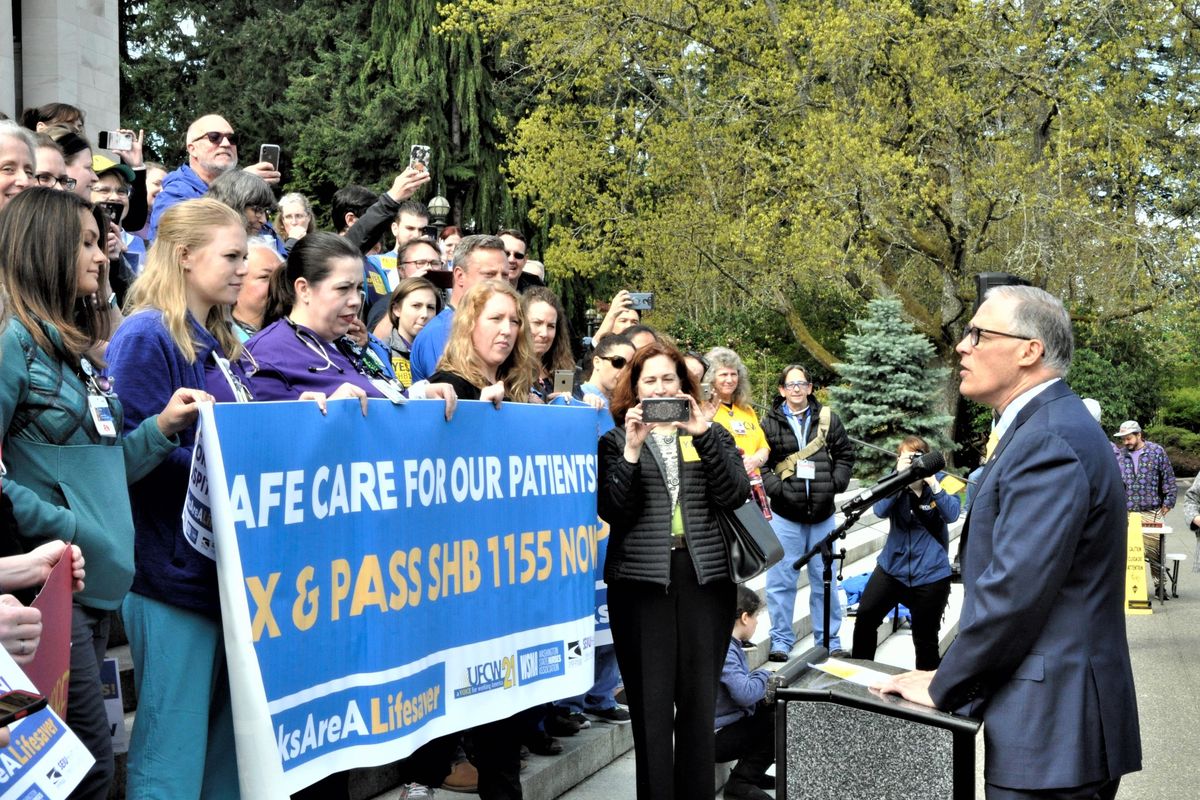Legislature requires hospitals to give rest and meal breaks to nurses

OLYMPIA – Nurses and other hospital staff would get regular rest and meal breaks and other guarantees in their schedules under a bill that received final approval in both chambers of the Legislature on Wednesday.
The issue became a sensation in the past week when an Eastern Washington lawmaker suggested nurses in small hospitals with relatively few patients don’t need mandated breaks, because their schedules are such that they probably spend part of their shift playing cards.
Nurses responded by sending Sen. Maureen Walsh, R-Walla Walla, tens of thousands of emails and, at last count, 1,700 decks of playing cards.
With nurses and medical technicians looking on from the galleries Wednesday – including one dressed in a costume of the King of Hearts from a deck of cards – the Senate and the House both passed a revised version of a mandatory health care workers scheduling bill. Earlier in day several hundred of them had gathered on the steps of the Legislative Building to demand a vote.
“It’s taken 10 years to pass this bill,” Sen. Karen Keiser, D-Kent, a longtime supporter of the change, said after the Senate approved it on a 32-16 vote.
State labor regulations require “intermittent breaks,” for something like a restroom break or a snack. Anything else is left to negotiations between employees and hospital administrators, she said.
The bill says hospitals must provide time in their scheduling for meal and rest breaks. There are exceptions for unforeseen or unavoidable emergencies, although if a break is interrupted for one of those conditions, the worker must be give an uninterrupted break later. The bill also has new requirements for paying overtime.
“It’s taken a long time to get here,” said Rep. Marcus Riccelli, D-Spokane, the sponsor of the bill. The House has passed a version of the bill for the past five years, only to see it die in the Senate.
Hospitals have objected, saying such a requirement would cost them too much money to hire extra staff, if they can be found, to fill high-skilled medical positions during the mandated breaks.
This year, the Senate initially passed the House bill with an amendment that excused some small, primarily rural hospitals from the break requirements. During that debate last week, the bill became particularly controversial because of Walsh’s card-playing comments.
KING5 TV / KING5 TV
“I was just offended by her comments,” said the technician who wore the costume. He declined to give his name, but said he works in a cardiac intensive care unit in a major hospital.
After the Senate passed the bill with exceptions for smaller hospitals, the House rejected those changes and the bill went to a conference committee. In the negotiated settlement, the small hospitals with fewer than 25 beds will be subject to the break requirements, but get an extra two years, until July 1, 2021, before the law applies to them.
Walsh apologized this week to any nurses who were offended by her comments. She claimed she was tired and misspoke in the earlier debate. But she didn’t change her mind on the issue, and Wednesday voted against the negotiated bill, prefacing her speech with “I will be very careful with my remarks.”
She called the bill an attempt at a “one-size-fits-all” solution to a state with many different types of hospitals. Legislators shouldn’t dictate to hospitals, she said.
“No matter where a nurse works, they deserve to have clarity,” Sen. Rebecca Saldaña, D-Seattle said.
“It really makes sense we are taking care of people who take care of us,” Sen. Manka Dhingra, D-Redmond, said.
Keiser said later the fact that Walsh misspoke when she was tired actually proves the point that rest breaks are important, and even more so for nurses whose jobs can require life-or-death decisions.
About two hours after the negotiated bill passed the Senate, it came up for a House vote, where opponents again argued the state should stay out of hospital work rules.
“This is something that should be bargained at each hospital,” said Rep. Joe Schmick, R-Colfax.
But the bill passed on a 70-24 vote and was sent to Gov. Jay Inslee, who is expected to sign it. He told nurses and medical technicians at the morning rally on the Capitol steps, “We’re going to get this done.”
The bill isn’t just for medical workers and their families, Inslee said. “This is for the health of patients.”